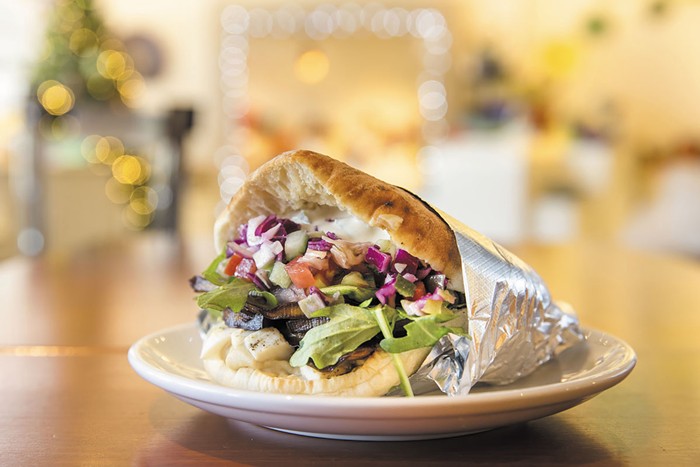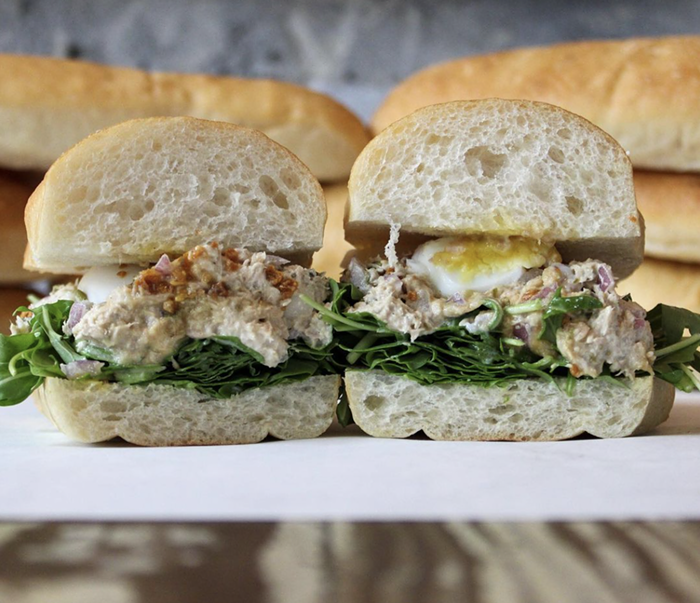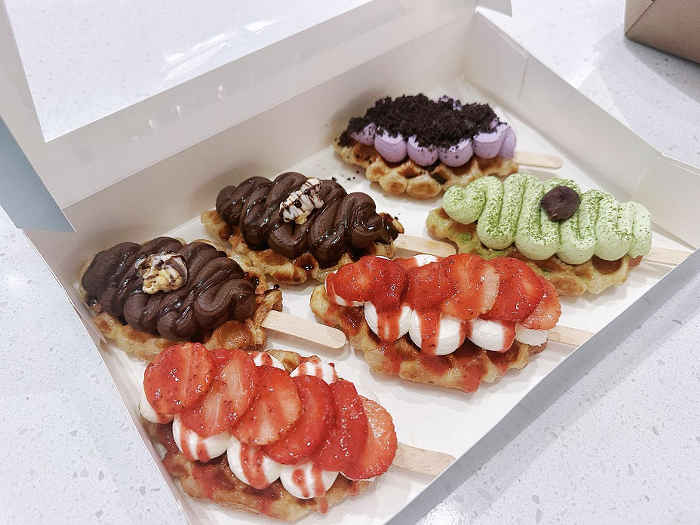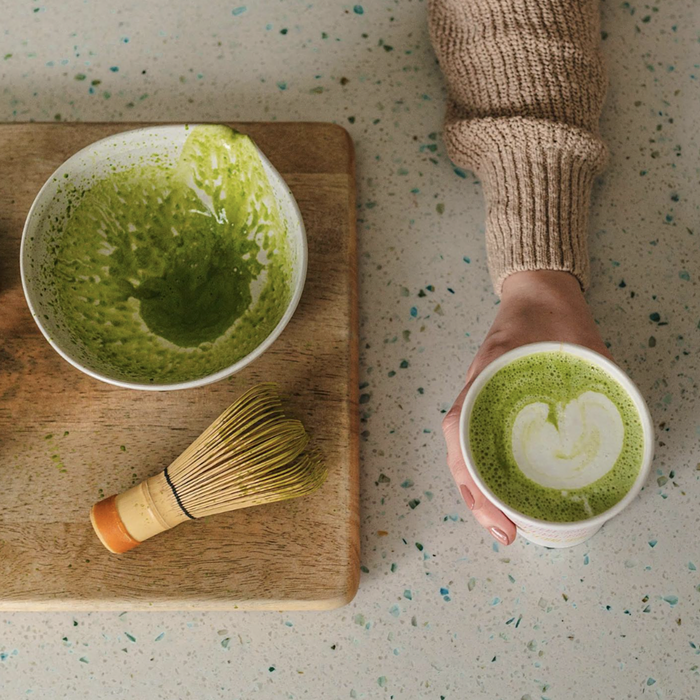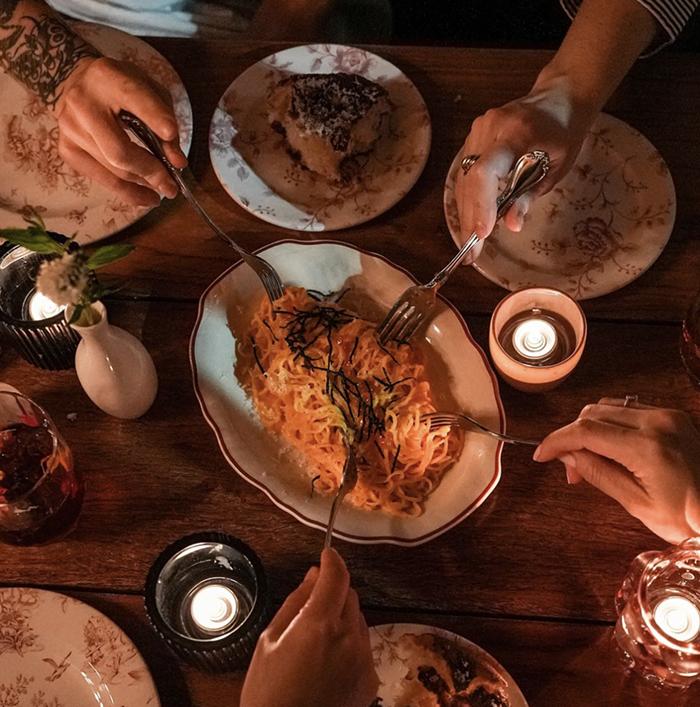One could easily walk into Eggs and Plants, order what's familiar—perhaps the falafel—and walk back to the office with no clue what sort of treats you missed out on. It's not that the crisp, light Egyptian-style falafel aren't up to snuff (they are), but that this barely-signed vegetarian cafe in Belltown holds so much more than you might ever know: undersung Israeli specialties, fluffy pitas, date smoothies that taste of desert sunshine, and a unique treat of a view.
The menu bills the food as Mediterranean, but more specifically the food is Israeli. Though it identifies Moroccan eggs, an Iraqi sandwich, Persian omelets, and Yemeni flatbread, what brings them together is their adopted homeland. Israel is a country of immigrants, with local traditions joined by those of Jews from around the world—those who arrived before, during, and after the country was established in 1948.
Today there are almost no Jews left in Yemen, but Yemeni-Jewish foods, like the malawach served at Eggs and Plants, flourish in Israel. The flaky flatbread is reminiscent of an Indian paratha or Malaysian roti, but comes with the traditional Yemeni accompaniments of a hard-boiled egg and grated tomato. The puff pastry for the thick, layered pancake, like the pita that is used here, comes from an Israeli baker in New York.
When Eggs and Plants first opened just over two years ago, it made all the pita in-house. As volume grew, manager Nikolas Medenas says, the baker couldn't keep up—she was working every day while also going to school at the University of Washington. Owner Yair Rivlin says finding the right bread was the hardest part of opening the restaurant. Now the pita comes from across the country and gets heated to the baker's particular specifications. It comes out pillowy soft, thick, and warm—the texture impressive even for an in-house version, doubly so for a shipped product. The softball-sized pitas split open at the top, leaving a surprising amount of room for falafel, shakshuka, or the fried eggplant of the house specialty sabich to nestle down into.
Food-nerd handbook Lucky Peach recently declared sabich to be "having an 'it' moment" in the United States. The sandwich was also Rivlin's inspiration to open Eggs and Plants: "You could find falafel here, you could find shakshuka, but sabich—I didn't see it anywhere." Lucky Peach traces the history of the street food as it entered Israel with Iraqi-Jewish immigrants in the 1950s as a Shabbat breakfast, then onto the streets of Israel in the 1980s. The sandwich starts with fried eggplant and comes an avalanche of toppings: chopped egg, pickles, hummus, Israeli salad, cabbage salad, and tahini. Eggs and Plants' version overflows messily, as is typical of the dish, making it even more indulgent.
When Michael Solomonov, the James Beard Award–winning American-Israeli chef at Philadelphia's Zahav, stopped into Eggs and Plants while he was in town, he expressed enthusiastic surprise about it to KUOW. Most US restaurants billed as Israeli, he explained to the radio station, are like red-sauce Italian-American food compared to real Italian cuisine: tasty but entirely off the mark. Eggs and Plants, however, is cooking the foods that have long stood in the shadows of falafel and hummus as emblems of the Israeli diet.
In order to do that, Eggs and Plants has adapted, not only by bringing in the pita and puff pastry from New York, but also in how it serves some dishes—like the shakshuka sandwich. "If you want traditional shakshuka," Medenas says, "order it as a platter instead of a sandwich." The dish normally features eggs served in the tomato sauce in which they are poached, with bread for dipping. Here, the same eggs nestle into the soft pita along with fried potato slices, hummus, Israeli salad, cabbage salad, pickles, and tahini. It is a Moroccan dish adopted as an Israeli breakfast, made into a sandwich here in Seattle. Just as the immigrants to Israel adapted their cuisine to their new surroundings, Rivlin's cafe adapts Israeli food to the city where it has landed. That includes skipping the parts that can't be done locally—those familiar with Israeli food may note that there is no amba on the sabich. Rivlin says he personally doesn't love the bright-yellow fermented mango sauce that often perks up the specialty with a bit of funky fruitiness, so he hadn't worried too much about it when opening Eggs and Plants. Now that the cafe is more established, he says he's put finding a source for it on his priority list.
But with or without the amba, the local Israeli community embraced the cafe early on—often dispensing honest advice and helpful tips to Rivlin after a meal. Other audiences have taken longer to warm up to the vegetarian spot: "People come in and want a gyro," says Rivlin, and they get upset the menu has no meat. "There's an element of education: In the Middle East, this is what people eat for lunch, for dinner. It's very filling."
But over the last two years, plenty of people have found their way to the tiny—but extremely special—corner of its building in Belltown. Once inside, it seems like an average lunch spot: a drinks fridge on the left, a few tables in the window, and a counter at which to order. But after each order, the counterperson lets diners in on a little secret: Head down the hallway on the right to the seating area, which looks directly into Seattle Glassblowing Studio. While diners await their refreshing house mint lemonade (more of a slushy, really, than a drink), they can watch amateurs and experts create colorful vases, tiny delicate horse ornaments, and all types of glass art in the fiery hearth of the studio. The big picture window from the seating area into the studio is similar to so much at Eggs and Plants: unadvertised, unknown, and yet there for the taking. Go sometime. Order the sabich or the malawach, even though you've never heard of them. Then take the advice of your server to mosey on down the hall for a better view. ![]()
